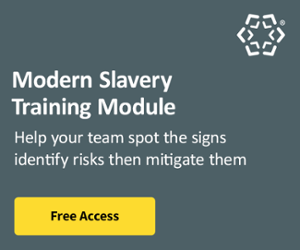The International Labour Organisation (ILO) estimates that around 50 million people worldwide are subject to modern slavery.
When the MSA was first introduced, it was considered ground-breaking, with some quietly hoping it would deliver much-needed transformational change.
Almost a decade later, the flagship policy is yet to live up to its early promise. Initial scepticism that this would become just another tick-box exercise now looks prophetic.
Modern slavery headline figures
- 12,727 potential victims of modern slavery were referred to the Home Office in 2021, which is a 20% increase from the year before
- only 40% of companies provided sufficient disclosure on slavery risks
identified in their supply chain - around 10,000 people in the UK are living in modern slavery, with slavery experts suspecting this number is higher
- 58% of potential victims claim exploitation in the UK only, while 31% claim exploitation overseas only
- 71% of companies believe there is some likelihood of modern slavery in their supply chain, according to the Ashridge Centre at Hult International Business School
- Less than 50% of companies provided a clear and comprehensive discussion about modern slavery concerns in the context of their organisational structure
- According to the Financial Reporting Council (FRC) report, only 12% of companies failed to provide a modern slavery statement; however, the majority of statements are wholly backwards-looking and don't identify emerging issues
How to conduct a Modern Slavery audit?
Large businesses across the UK must carry out the necessary due diligence in their own company and supply chains to help combat modern slavery and human trafficking.
Under Section 54 of the Modern Slavery Act (MSA), companies with an annual turnover of £36m or more must publish a Modern Slavery Act statement at the end of each financial year, covering their own business and supply chains.
Even though hundreds of investigations are active, the UK Government urges businesses to do more to tackle modern slavery in their supply chains.
The number of people now thought to be held in slavery worldwide is more than in the 18th century at the height of the transatlantic slave trade.
1. Check your modern slavery statement
When did you last look at your modern slavery statement? Be honest. Perhaps it's time to revisit and refresh that. Assess what improvements you need to make to bring it up-to-date. It's time to go beyond the generic statements and minimum requirements and make it more meaningful.
Modern slavery statements should be:
- Published on each company's website with a link to the complete statement placed prominently on the company homepage.
- Approved by the board of directors, ideally including the approval date (according to Home Office best practice).
- Signed by a director.
2. Identify modern slavery risks
Only 29% of companies provide clear disclosure of slavery risks identified
in their own business, with less than 28% disclosing an action plan based on the risks identified.
It’s important to identify the key risks within your business. Think about which parts of your supply chain or business areas are most vulnerable. Know which products and services are more prone to slavery.
While you will have made efforts to identify these risks when the legislation came into play, how long has it been since you reviewed them? Perhaps now might be the time.
3. Conduct supplier due diligence
Ask your suppliers to provide a copy of their Modern Slavery statement and conduct audits on those that fall into high-risk categories.
Enquire into their operations, how they source labour and materials, the prices paid to their suppliers further down the supply chain, etc.
4. Perform human rights due diligence
Perform human rights due diligence on your business and your global supply chain to better understand potential areas of exposure or key risks in your operations. Engage with local stakeholders in different geographic locations who may have specific awareness of the local operating environment to help identify risks and draw attention to worker exploitation issues.
5. Review workplace modern slavery policies
When the MSA was first introduced, companies reviewed their existing corporate policies regarding slavery and human trafficking and updated them if needed.
However, companies should review these policies regularly to ensure they are kept up-to-date and reflect any changing risks.
- Are your modern slavery policies as clear as they could be?
- Are there explicit policies (e.g. covering migrant workers, ethical trading, responsible sourcing or human rights)?
- Do they align with and reinforce other initiatives (such as UN Global Compact or Ethical Trading Initiative)?
- Is there anything else you can introduce to take greater control over eliminating modern slavery in your business and supply chains?
- Is it clear how current policies link to modern slavery, and do they explicitly reference this?
- Are policies sufficiently detailed, or are they just warm words?
- Are there policies that deal with non-compliance among suppliers, for example?
- Is there a willingness to work together to address breaches or alleged exploitation, or will contracts be severed?
- Are policies, standards and codes cascaded through the supply chain and embedded in contracts?
Any fuzziness may create confusion, at best - or worst-case scenario, result in non-compliance.
6. Appoint someone to take the lead
Accountability fosters responsibility. By giving a senior staff member the responsibility for driving forward your efforts to eliminate modern slavery and trafficking in your business and supply chain, it may get a new lease of life.
- Empower them to drive change forward.
- Ensure they have the necessary resources - e.g. people, time, information, and training.
- Encourage them to raise awareness and show why this matters.
- Appoint Champions or mentors across the business who can educate, respond to problems, and tackle worker issues or concerns.
7. Train your staff
Training your staff to spot the signs of modern slavery inside your company and throughout your supply chain is key. Training should focus on red flags to look out for and what to do if foul play is suspected.
Now, you may already have a modern slavery training course. But how engaging is it for your employees? Have you achieved a 100% completion rate? And how relevant is the content to your specific company?
It only takes one person to commit a violation for your company to come under threat. Tailoring off-the-shelf content or creating truly bespoke courses is one way you can make training more relevant and engaging.
8. Use modern slavery best practices
Collaborate with peers across your sector and industry to benchmark progress and best practices. Get a better understanding of the modern slavery risks inherent in your business or supply chain to investigate risks and develop initiatives to drive industry-wide or sectoral change.
Be open-minded - sign up to initiatives and codes or join working groups to share intelligence and help combat trafficking.
9. Ethical business: Profit with integrity
Stakeholders and investors need to signal to companies that rigorous due diligence and human rights management demonstrate good governance and effective management. We want more trailblazers and early adopters - companies who lead by example and inspire others to act.
As consumers, we are prepared to vote with our feet and simply won't tolerate abusive practices. Where there's more focus on ethical profit and the 'right culture', business leaders have a greater incentive to monitor their supply chains.
Want to learn more about Modern Slavery?
We’ve created a comprehensive Modern Slavery roadmap to help you navigate the compliance landscape, supported by e-learning in our Compliance Essentials library.
We also have 100+ free compliance training aids, including assessments, best practice guides, checklists, desk aids, eBooks, games, posters, training presentations and even e-learning modules!
Finally, the SkillcastConnect community provides a unique opportunity to network with other compliance professionals in a vendor-free environment, priority access to our free online learning portal and other exclusive benefits.











